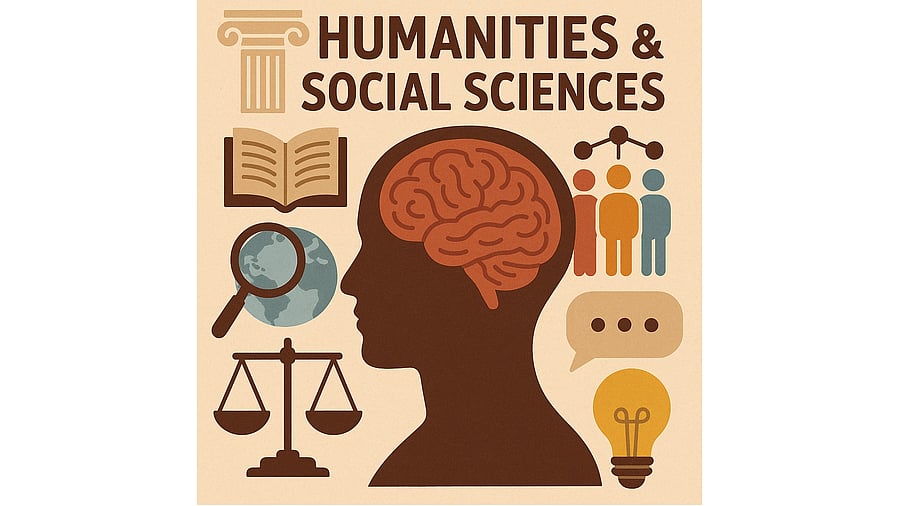
Humanities
A hundred years ago, careers in philosophy, literature, education, and law were in high demand, and some of the country’s top leaders studied these fields. Slowly, in the latter half of the 20th century, science gained the upper hand, and then technology took over. With a saturation of engineering graduates in recent years, students have shifted towards fields such as commerce, accountancy, banking, and finance. The humanities, also known as the Social Sciences, have occupied a back seat for a long time, but a slow and steady revolution is taking place in these fields, and many people are unaware of it.
Not only do we have very promising careers in these fields, but many reputed institutions have also evolved, offering quality education. In the past few years, many engineers from top institutions have opted to pursue higher studies in economics, management, or international affairs and are doing very well. Similarly, those who have studied Law are opting for International Law and Global relations.
History has evolved beyond traditional studies, embracing an understanding of geopolitical issues, such as the long-standing conflict between Russia and Ukraine, or Israel and Iran tensions, which provide insights for future decision-making in politics and business. Many reputable universities offer degree and postgraduate courses in history, sociology, anthropology, and political science.
Economics is another field that has been steadily developing. It teaches us to understand how economies function and how resources are allocated. Vital issues such as inflation, unemployment and trade balances are developed and monitored by economists. These factors, in turn, have a direct impact on businesses and, consequently, on their profitability. Social Economics is a fast-growing field that takes into account social and cultural aspects of economies, and many Nobel Prizes have been awarded in this area. A study of economics also opens the doors to careers in finance and business, where decision-making based on economic data promotes the success of the organisation.
International Relations (IR) is a field of study picking up fast since organizations need to have a deeper understanding of how countries interact, negotiate, and cooperate on global issues such as climate change, trade agreements, and geopolitical tensions (like how the USA is currently helping Ukraine negotiate a ceasefire with Russia).
In a world where countries are increasingly focused on their interests and forming new partnerships, studying International Relations will help students understand the challenges of collaborating on issues such as diplomacy, human rights, and peace treaties. For example, professionals who understand trade-cum-political relations between the USA and China or the European Union’s role in global politics can be very useful to organisations both in India and abroad. International Relations is also linked to important global issues, such as economic growth, job creation, and climate change.
International trade plays a crucial role in the global economy, allowing nations to access products they might not be able to produce on their own. For example, one country may sell its agricultural products to another that is rich in technology, leading to mutual benefits. Students who develop expertise in this area can work in businesses that operate internationally. Diverse job openings in this field include import/export business, global logistics, international marketing, and the supply chain ecosystem. These roles often come with the excitement of working with different cultures and countries.
Colleges in demand
Some of the reputed institutions offering very good courses in the above fields include All India Management Association (aima-ind.org), Amrita School of Business, Asia-Pacific Institute of Management (asiapacific.edu), Christ University, Indian Institute of Foreign Trade (iift.edu), IIMs, Indian School of Business (isb.edu), IITs, Management Development Institute MDS (mdi.ac.in), S P Jain, Symbiosis, and many others.
Good institutions specialising in Economics and related fields include the Delhi School of Economics (econdse.org), the Bangalore Ambedkar School of Economics (base.ac.in), the Institute of Social and Economic Change (isec.ac.in), Ashoka University (ashoka.edu.in), IIT Bombay, and FLAME (flame.edu.in).
Related fields offering good career opportunities include Liberal Arts, Foreign Languages, Translation, Documentation, Diversity Management, Disaster Management, and Corporate Social Responsibility. Those who are focused on human development and have a flair for understanding people and societal development can find steady and promising careers in these fields, both in India and abroad.
Following the advent of AI, many students are hesitant to pursue the humanities, as they fear that AI will render their field obsolete. This is only partly true, for the simple reason that AI is a tool to enhance efficiency in any field, and not an isolated field in itself. Learning the basic use of AI tools can enable people to understand and progress efficiently in these careers.
Mr. Ganesh Srinivasan, a consultant in foreign exchange for the last 30 years and a Mentor to youngsters building their careers, believes that studies in the humanities are extremely relevant today, if not more so than ever before, for several reasons. As all countries become more interconnected, these subjects offer students the critical thinking skills they need to make informed decisions and pursue successful careers in a rapidly changing world, regardless of where they choose to live.
As the world becomes a global village, individuals and organisations need to understand all aspects of different countries and cultures. After qualifying in these fields, students can work for large companies and multinational corporations (MNCs), International bodies such as the United Nations Organisation (UNO) and its subsidiaries, government departments, or non-governmental organisations (NGOs). Professionals working in any specialisation need to have a deep understanding of history, economics, and International Relations if they wish to succeed and aim to become effective leaders of tomorrow.
(The author is an education and career cousellor)
Send in your queries to us at dheducation@deccanherald.co.in with ‘Study in India’ in the subject line.